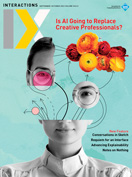Authors:
Elizabeth Churchill, Mikael Wiberg
Welcome to the September–October issue of Interactions! This issue brings together a number of topics, from reflections on artificial intelligence to considerations of how delightful app experiences can fall foul of product acquisitions and the decisions made around them.
As everyone has noticed, over the past few months the world has been churning around the impact of new innovations in AI, especially around large language models (LLMs). Big companies are vying to own the biggest leaps forward, and we are told we will be seeing many changes in how data is reimagined through the lens of AI, in how we as users will interact with information, in how we will engage and expand our creativity, and in how we will increase our productivity. With the superpowers brought to us through AI, there are huge promises being made about how we will benefit from the use of this technology—hyperbolic excitement about the potential gains AI will bring abound, matched equally by profound concerns about inaccurate information dissemination, job losses, and more. Indeed, at the time of writing this, the film industry is reeling with concern about Al-developed scripts and simulated humanlike protagonists, where Al-generated content is deeply affecting the livelihood of screenwriters and actors. It is obvious that there is great potential for both positive and negative consequences.
Related to this latter concern, Bhautik Joshi's cover story directly addresses how AI tools and techniques will affect creativity. Will creatives lose their jobs as a result of the AI "revolution"? His analysis suggests we should focus on what people can do with AI applications rather than on whether AI will replace human creators. Patrick Gage Kelley and Allison Woodruff share their approach to AI explainability, entreating us as designers and researchers to work on explaining the impact of AI tools and techniques at a more holistic level. Daniel Russell shares what he has been reading in the arena of human-centered AI, noting that things are changing so fast it is almost impossible to keep up.
Notably, one area on which we are hoping to see a lot more debate is the use of the term intelligence. As a metaphor, it is distracting and leads to some confusing conclusions about the power of contemporary AI-driven applications. One of the most important milestones in the early history of AI was the Turing test, proposed by Alan Turing in his 1950 paper "Computing Machinery and Intelligence." The Turing test was explicitly designed to be a test of a machine's ability to exhibit intelligent behavior equivalent to, or indistinguishable from, that of a human. With the advances in deep learning, this debate is to some extent ramping up again, although arguably these models don't exhibit the characteristics of human intelligence and reasoning, even if their design is based on a model of neural activity in the human brain. We might need to look not only at comparisons with human intelligence but maybe also explore other metaphors, measurements, and models.
In a different sphere, Yuki Chen, Jonaya Kemper, Erik Harpstead, Ross Higashi, and Judith Uchidiuno share research into their video game character-creation tool designed to offer character selection and customization for Black children. Too few options are typically offered, and studies showed how much the children enjoyed having a better range of skin tone, facial features, and hairstyles to choose from to create characters that they could relate to.
In addition to these articles, we are working on some new formats for sharing insights and perspectives. One example is Miriam Sturdee's Conversations in Sketch. Miriam will be interviewing HCI and UX professionals and illustrating conversations in a comic-style format. She will also be inviting other artists and "sketchnoters" to illustrate key themes and topics. As well as experimenting with new formats, we will be moving away from strongly themed issues toward loosely related features around topics like human-computer interaction and food, digital civics, and children and technology. We are aiming to include contributions that emphasize work at the intersection of design, research, engineering, and product development, while maintaining the magazine's focus on critical perspectives.
Finally, before closing, we'd like to invite submissions in all our current and emerging categories, and are seeking volunteers to curate content. Please get in touch if you have energy, time, and great ideas.
Elizabeth Churchill and Mikael Wiberg
[email protected]
Copyright held by authors
The Digital Library is published by the Association for Computing Machinery. Copyright © 2023 ACM, Inc.








Post Comment
No Comments Found